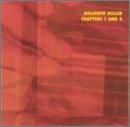| All Artists: Mulgrew Miller Title: Chapters 1 & 2: Keys to the City / Work Members Wishing: 0 Total Copies: 0 Label: 32. Jazz Records Original Release Date: 6/23/1998 Release Date: 6/23/1998 Genres: Jazz, Pop Styles: Modern Postbebop, Bebop Number of Discs: 1 SwapaCD Credits: 1 UPC: 604123205528 |
Search - Mulgrew Miller :: Chapters 1 & 2: Keys to the City / Work
 | Mulgrew Miller Chapters 1 & 2: Keys to the City / Work Genres: Jazz, Pop
|
Larger Image |
CD Details |
CD ReviewsNumber #1 jazz pianist today John P. Perhonis | University Park, Maryland United States | 03/23/2002 (5 out of 5 stars) "Mulgrew Miller has more recently recorded in a number of settings, mostly notably with Benny Golson. His jazz solo or trio settings are reflected in his earlier albums, such as this one. It is clear from just listening to a track of this album, particularly "Without a Song," that we are in the presence of a major jazz musician who has brilliantly synthesized the best of the jazz tradition as reflected in the jazz piano greats - mostly notably Bud Powell, Wynton Kelly, Oscar Peterson, and McCoy Tyner. In this track as well as others on this fine album, there is a rhythmic drive, a poignant lyricism, and a straight-ahead spirited energy that reflects the best of modern jazz piano. The father of the modern jazz piano, of course, is Bud Powell. Bud, for all his nervous energy, ALWAYS made a musical statement and ended it with a period, not a dash. He didn't just meander around hitting on this incomplete phrase and then that phrase. He created series of LONG musical statements, much like Walt Whitman did with poetic lines, and he mostly did it with single note runs. The best of bebop rightly uses him as a measure of success, and now we have the standard by which to judge post-bebop - someone who has added much to Bud's approach with the help of the post-bop players, mostly notably McCoy Tyner. As in all excellent jazz, the framework of the song itself, whether a standard or an original, provides a container through which an enormous energy and drive is released. The exalted sense of lyricism that comes out during the most intense solo improvisations in this album is testimony to this. Mulgrew is always profoundly aware of the inspiration that comes from the song itself. He respects the song as larger than himself, and he obtains his greatest strength from it, and this is something the best of post bebop hasn't lost. It is a lesson to the younger players coming up: if there is something great going on in your playing, it is not YOU playing jazz; rather, jazz is playing YOU. This album and other trio albums of Miller from this period are to my mind the pinnacle of post-bop jazz piano playing, and among the best of modern jazz piano. You could do worse than to own everything Mulgrew produces, because he isn't a prolific recorder (I hope that changes). In summary, one could say that Mulgrew Miller takes the Oscar Peterson Trio from the famous London House recordings in Chicago even further by intensifying it beyond belief, if that is possible, with Bud Powell's crazy energy and drive, weighing in heavily with McCoy Tyner's dramatic and chant-like torrents of sound, adding Wynton Kelly's blues based swing, which is unprecedented (I think Kelly comes close to being the "best" as well), and of couse, giving it his own thing -- to such an extent that now Mulgrew Miller should be listed as THE father of post-bop piano. Younger jazz pianists, particularly those of you who are "better" known and have recorded more than Mulgrew, please get down on your knees for one moment and pay heed to this giant." Mulgrew joins Hank, Tommy and Kenny at the top piano level. George Ziskind | NYC | 07/05/1998 (5 out of 5 stars) "Primo modern jazz piano playing; post bop if you require titles, yet encompassing the whole tradition. These are Mulgrew's first two Landmark sessions, on one CD. The track list is wrong - item #3 is actually a ballad (I think I remember that it is "Every Time We Say Goodbye") and then Promethean and all the other tunes follow in order but with their position one digit higher."
|

 Track Listings (14) - Disc #1
Track Listings (14) - Disc #1